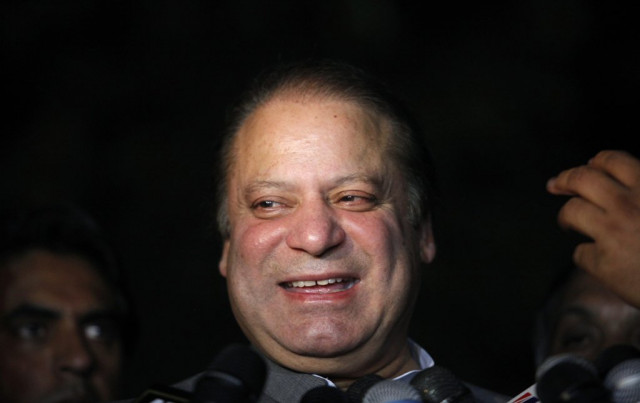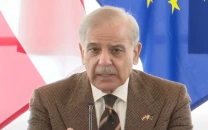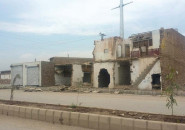PM’s counsel ducks ‘key’ London flats trail query
SC observes no document submitted to establish Hussain Nawaz as London flats’ original owner

Prime Minister Nawaz Sharif. PHOTO: REUTERS / FILE
“It is still a fundamental question as to how the money was being generated to purchase the London flats,” said Justice Ijazul Ahsan, a member of the three-judge bench hearing the Panama Papers case which revolves around Sharif family’s offshore properties.
He observed that the ruling family did not produce any document to establish that Hussain Nawaz [PM’s son] was the original owner of London flats but the JIT, on the other hand, had found out that Maryam Nawaz [PM’s daughter] was the real owner of those apartments.
The bench also observed that Sharif family did not submit any document to substantiate that the PM’s father, Mian Sharif, had presented as gift his real estate business in Qatar to Hussain Nawaz.
Justice Ijazul Ahsan also questioned why the prime minister claimed on the floor of Parliament that all relevant documents were available to show source of the funds used to obtain the offshore properties.
Another judge, Justice Azmat Saeed Sheikh, remarked that the judges could not shut their eyes to the fact that no document was submitted by the Sharif family to substantiate the source of funds used to establish Hill Metal, a leading steel company in Saudi Arabia allegedly owned by the ruling family.
Onus still on Sharifs to give money trail: SC
“Though source of fund has not been provided by the prime minister, he received 86 per cent profit from the same business,” he observed. Justice Ejaz inquired as to how PM Sharif’s children acquired offshore assets in 1990s when they had no sources of income.
On Wednesday, the PM’s counsel Khawaja Haris contended that the JIT did not level any allegations of corruption against Prime Minister Nawaz Sharif. “The JIT did not say in its report that the prime minister misused his power to earn money,” he said.
PM Nawaz’s counsel contended that the high-powered inquiry panel did not level any allegations of corruption against his client as no documents were produced by the probe body to prove the premier’s ownership of the London flats.
“No document has been submitted to show that the prime minister is the real owner of disputed properties,” he maintained, adding the National Accountability Bureau (NAB) could not proceed with an investigation against his client because properties were not in his possession.
Instead of presenting his contentions on factual points raised by JIT in its report, the PM’s counsel, while concluding his arguments, limited himself to highlighting procedural flaws in the report, in a calculated strategy to declare the material collected by the JIT as inadmissible.
SCBA, LHCBA call for countrywide strike
The JIT had disclosed that the PM was chairman of the board in another offshore company, FZE Capital UAE and he concealed the fact while filing statutory returns or making declarations before the authorities concerned in Pakistan – including tax authorities or the Election Commission of Pakistan.
The report had also pointed out that the premier in his tax return in 2013 had claimed that he made a donation of Rs100 million to the PML-N and concealed the fact that he received back Rs45 million from the same party account before the close of the relevant financial year – a move that the JIT said amounted to ‘misdeclaration of wealth’.
Interestingly, neither Khawaja Haris responded to the JIT’s revelations against PM in his written objections nor he gave any detailed oral explanation on those points.
Appreciating his strategy, legal experts said that Khawaja Haris made a smart move by confining himself to legal points and avoiding arguing on factual points; otherwise, the bench’s remarks on factual points could have adversely affected the PM.
Likewise, instead of adjudicating on the JIT's findings, the bench has also confined itself to London flats issue in two days of hearing. The legal experts believe that the SC will not pass any adverse order against the PM on the basis of the JIT material, which was not confronted before him during the interrogation.
Dar’s counsel given hard time
The bench gave a hard time to Tariq Hassan, counsel for Finance Minister Ishaq Dar. The court made it clear that Dar tried to get shortcut but relief could not be granted to him at this stage, adding that he was allegedly involved in money laundering by transferring money.
Justice Ijaz said Dar hid himself behind privileges and did not share necessary information with the JIT during the interrogation. The court observed that the present status of Dar was that of a co-accused after he disowned his confessional statement in Hudabiya Paper Mills case.
The bench asked Dar’s counsel to provide all the relevant documents, which have not been produced before the JIT. Salman Akram counsel for PM’s children will start his arguments today (Thursday).


















COMMENTS
Comments are moderated and generally will be posted if they are on-topic and not abusive.
For more information, please see our Comments FAQ